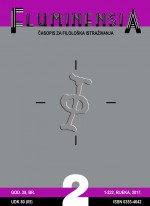SOCIALIST REALISM IN LITERARY DEPICTIONS OF WAR (THE CASE OF CROATIAN PROSE NARRATIVE)
Keywords:
socialist realism, language of totalitarian culture, a new man, World War Two, Partisan´s image of worldAbstract
In this article paradigms of socialist realist poetics in prose narrative on World WarTwo are taken into consideration. Some key ideologemes of socialist realism and communist worldview are underlined, such as absence of ambiguity (unequivocalness), simplifi cations, consistent mimeticism (truthful and historically concrete representation of reality), class awareness, militancy and heroism in war. Alongside theoretical and official directives, formulated by dogmatic theoreticians of socijalist realist doctrine (like Jure Franičević-Pločar who based his understandings of literature on the Soviet principles, created by Zhdanov and Stalin), there are given analyses of some literary texts written by Josip Barković, Joža Horvat, Ivo Andrić i Mate Beretin. The author focuses on literary construction of characters – the prototype illegal partisans who ruthlessly struggle against the occupiers as well as chronotopic settings which enable for the action to be set within schematized confl ict of good and evil. Including the new communist man, that is created during the revolution, there are given crucial political orientations concerning the canonized vision of the war, such as the principle of symmetry (meaning that all peoples’ traitors are fascists) and the vision of the liberation from fascism as the victory of the communist revolution (in this perspective, communists are depicted as the sole antifascists).

